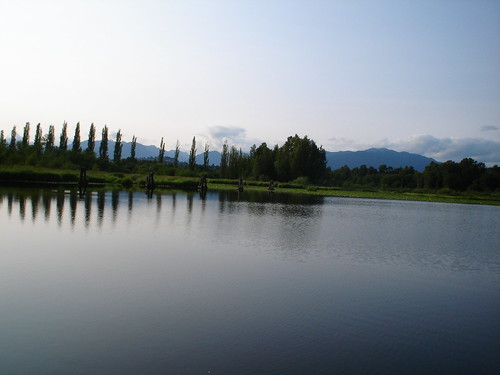One of the things that has struck me a lot throughout the past five years that I have studied water policy is the absolute disconnect that exists between our understanding of the different elements of the hydrological cycle and their interconnectedness. The social sciences literature has examined in great detail issues of water scarcity, but water quality and wastewater treatment are, for the most part, absent from the discussion.
I know that I have always chosen difficult and non-explored questions for my own research, and in this regard, I have created some sort of a niche because very few people study the governance of wastewater. Amongst those very few Canadian scholars who have done work in wastewater and that I know of are Dr. Arn Keeling (whose PhD dissertation was an environmental history of wastewater in Vancouver) and Dr. Jaimie Benidickson (whose book, “The Culture of Flushing“, is a great environmental and social history of flushing in Canada, the United States and Great Britain).
My own work hasn’t dealt with Canadian wastewater, but I do have a fairly solid understanding of the way things work here. I am sure you’ll find it appalling that the city of Victoria, the capital of the province of British Columbia, does NOT have a wastewater treatment plant. The effluent comes straight into the ocean (with some preliminary screening).
A recent post by Matt Collinge about water quality in False Creek reminded me of how little do people in Vancouver AND in Canada think about wastewater. This is something that is prevalent at the larger scale. Professor Dickinson indicates that this is part of “the culture of flushing”, or what I often call, the OOSOOM phenomenon (out of sight, out of mind).
One of my personal pet peeves is that both scholars and non-academics in Canada are SO focused on climate change issues that sometimes they forget other environmental problems that have NOT been solved, including solid waste management (Vancouver’s landfill is about to be entirely full) and wastewater management (we are nowhere near some of the developing countries’ technologies for wastewater treatment, hard to believe as that may be).
My research focus in the area of water policy (I’ve done research in other areas) has examined primarily the role of institutions and the types of rules found in wastewater governance, and the role of watershed councils in strengthening sanitation policy. I found, after that presentation, and having had discussions with other scholars, that I will have to pursue two separate agendas in the future: one on wastewater governance itself and one on watershed councils, and I am very excited about this.
I am curious to know if my readers do think about water scarcity more than they think about what happens once they flush the toilet. Or does even water come into their minds, with so much focus on climate change issues? What do you think?



Waste flowing into the slow-flushing body of water between Vancouver Island and the mainland was the impetus for the creation of the Georgia Strait Alliance, which was organized to focus attention on the myriad sources of pollution – pulp mills and oil refineries spewing toxic effluent; the monstrous amount of untreated sewage; fish farms, military waste, road runoff, fuel spills, etc. That was almost 20 years ago and Victoria is still dumping raw sewage. Good luck with your research, more is needed, especially action.
Awesome post. Taking waste water policy into account is a huge issue. Surrounding the great lakes many industries are allowed to dump toxic chemicals directly into the lake, as long as they don’t exceed their quota. I think a few automotive companies literally have a pipe going right into Lake Michigan. This has a huge affect on the lives of the people who live there, and is one of the reasons I don’t any more. If I can’t swim in the lake because it’s polluted then that’s a serious issue. Runoff from farms, pollutants, etc that go directly into the oceans contribute not only to chemical imbalances, but introduce huge amounts of plastics. It’s boggling to think that we let this happen. It doesn’t have to be this way but as with most things, you have to appeal to someones wallet.
In Nevada, I believe, they’re recycling waste water, treating it, them pumping it back up river. I think they’re re-introducing about 10% of the waste water into the freshwater stream. It’s totally possible to do these things, but only where there’s either a scarcity of water (and were rich) will these systems be put in place. Legislation unfortunately, is required.
Actually, I think about water all the time. I live in a float cabin on Powell Lake. I watch the lake fluctuation constantly. The rise and fall are a daily reminder of how important water is in our lives. I am extremely careful about waste and waste water. What goes into my lake come back out into my cabin’s water source. Maybe if people lived closer to their sources of water they would think differently about it.
Margy’s last blog post..Simple Fresh Pickled Beets
This is an awesome post, although it was posted a while ago…
I actually think about water a lot. =)
This might be weird, but every time I go to the public bathrooms
and see the tab water running (not closed properly), I get the urge to
go after the person who left it running and tell the person that
we don’t have infinite amounts of water!!
And then I think about those in developing countries with no water…
We should ALL be thankful that we have access to clean water!
I wish I knew more about this; maybe I should change my final
research paper topic to water policy…Hmm…)